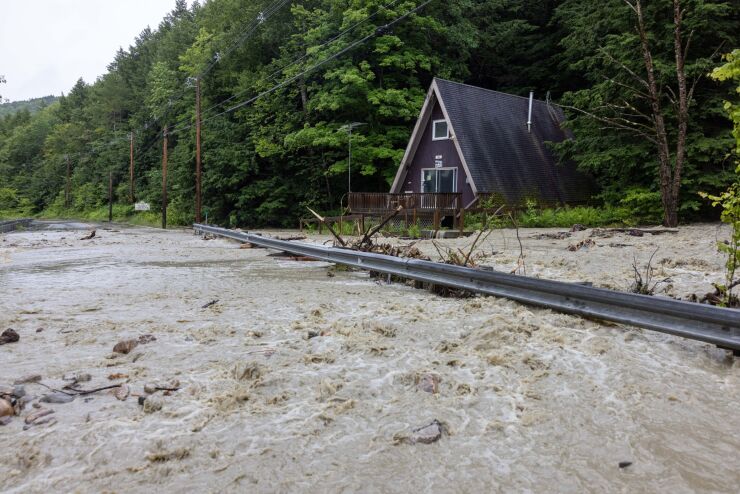U.S. financial regulators have not yet issued rules on climate-related financial risks, though some agencies have taken more steps in that direction than others, according to an analysis of their activities by the sustainable finance advocate Ceres.
The Treasury Department and the Federal Housing Finance Agency are among the regulators that have taken the most climate-related actions over the last year, Ceres says in a new report issued Tuesday. The Public Company Accounting Oversight Board took the fewest actions to incorporate climate issues into risk assessments, the report states.
Ceres based its report on over 100 climate actions taken by 10 federal agencies including the Treasury, FHFA, PCAOB, Federal Reserve and Securities and Exchange Commission between July 2022 and last month.
Agencies were graded in a scorecard across nine categories based on recommendations from the Financial Stability Oversight Council's Report on Climate-Related Financial Risk.
The report comes as Republicans on the House Financial Services Committee kick off a
The first hearing was held Wednesday and focused on
During Wednesday's hearing, Rep. Patrick McHenry, a Republican from North Carolina who chairs the House Financial Services Committee, noted that regulators under the Biden administration have paid more attention to "nonmaterial" ESG issues "rather than focusing on sound financial regulation."
"This misguided approach has led to increased costs and burdens for those participating in the U.S. public markets," McHenry said during the hearing.
As regulators have prioritized climate action and other ESG initiatives during the Biden administration,
In November, Kentucky Attorney General Daniel Cameron
In January, lawmakers in Nebraska
There hasn't been a "significant substantive distinction" among regulatory climate action over the last year, according to Caroline Swett, a banking and climate finance partner at the law firm Debevoise & Plimpton.
"U.S. banking regulators have narrow jurisdiction over these issues," Swett said in an interview. "It is to view [the climate] as a reasonable or legitimate risk that institutions should consider as part of their overall risk management."
However, she added, several key agencies have signaled the direction that they're moving toward, including the
The Treasury showed "notable progress" across five of the Ceres scorecard's categories after implementing more than 30 actions over the last year, according to the report. Ceres noted public statements from Treasury officials that affirmed climate change as a financial risk as well as the launch of department programs focused on researching climate-related risk data.
The FHFA, which regulates federal mortgage lenders and the Federal Home Loan Bank System, also received high marks in the Ceres scorecard for "incorporating climate change into regulated entity governance as a strategic objective," the report states.
The agency's actions cited by Ceres include guidance that led Fannie Mae and Freddie Mac to establish board-level committees to implement a climate risk management strategy and the creation of a working group to evaluate the impact of climate-related policies and program changes on consumers, including on historically underserved communities.
Attorneys general from 19 states issued subpoenas to six large banks seeking information about their climate policies. They say they're seeking to hold banks accountable for the fairness of their ESG policies to fossil-fuel companies, but others call it intimidation.
In the Ceres scorecard, all but one of the regulatory agencies that were graded in the scorecard showed "notable progress" in publicly affirming climate change as a systemic risk. The lone exception was the PCAOB, a nonprofit corporation established by Congress to oversee the audits of public companies.
Four categories where the majority of agencies showed at least "some progress" included producing research and providing supervisory guidance on climate risks, increasing transparency of climate-related risk management activities and assessing climate risks on financially vulnerable communities.
The category which regulators showed the least action over the last year was the issuance of climate risk regulation. Only the SEC showed "some progress" after unveiling
The Ceres scorecard found that the majority of actions taken by regulators have focused on "defining the problem" that climate risks present to banks and investors, according to Steven Rothstein, the founding managing director of the Ceres Accelerator for Sustainable Capital Markets.
"These are not environmental agencies. That's not their purview," Rothstein said in an interview. "They should be thinking about the safety and soundness of the entities they regulate and the impact on the market."
Rothstein said that regulatory climate action is a sign that agencies are "both following the market and giving a sign for where the market is headed."
"We hope over the next year that more progress is made on the regulatory front," he said.
Claire Williams contributed to this article.







